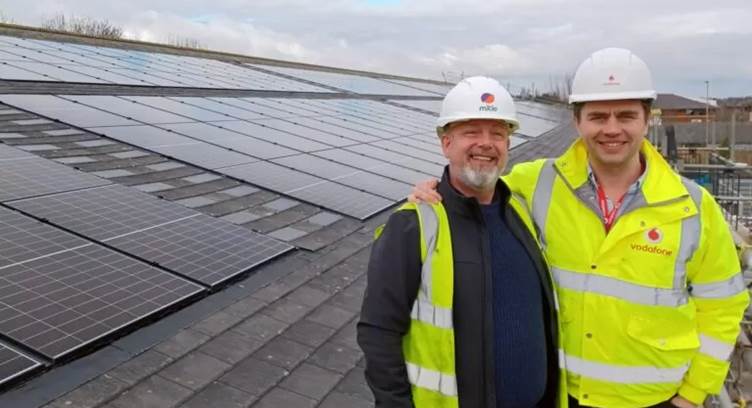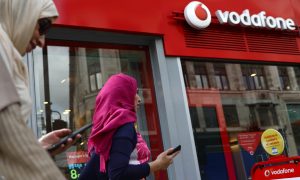

Vodafone UK is using big data analytics, AI, machine learning and Internet of Things (IoT) technology to optimise the energy efficiency of its network, which accounts for around 95% of the company’s total energy consumption.
Vodafone has also installed its first on-site solar panels at a mobile telephone exchange (MTX) network site in Gloucester. The site, which houses technology used to route phone calls and data to and from mobile devices, will use electricity generated from the solar panels to reduce reliance on the national grid.
Vodafone invests millions of pounds every year into energy efficiency measures and renewable power as it works towards net zero for its UK operations by 2027.
The rooftop solar panels being installed at the Vodafone MTX facility in Gloucester. This business has ‘de-coupled’ the link between data growth, energy usage and carbon emissions . D espite a 300% increase in data carried on Vodafone’s UK network since 2019 (including a 60% increase in the last two years alone), its overall energy consumption has remained flat. This is because a 4% increase in energy consumption, year-on-year across the network, has been counterbalanced by a 7% energy consumption decrease thanks to rationalisation programmes and energy savings initiatives. Plus, Vodafone’s UK carbon emissions 2 over the same period have fallen by 77%.
Vodafone is also using a big data analytics platform, developed in-house, to drive energy efficiencies across its owned 11,500 radio base stations. Artificial intelligence and machine learning help energy specialists identify ‘consumption anomalies’ – parts of the network using more energy than expected. Targeted actions can be then delivered to make the sites more energy efficient.
Another initiative – the Vodafone Smart Sites programme – uses Internet of Things (IoT) and AI on Vodafone’s highest energy-consuming radio base stations, enabling it to manage the sites remotely and reduce the need for engineer visits. As of March 2023, 1,300 sites have been connected.
Data from both programmes will be used to optimise future network and energy efficiency planning.
On-site power generation is the most efficient in terms of energy consumption and carbon emissions, helping Vodafone improve its energy security and accelerating its shift towards UK-grown renewables.
Tackling climate change needs ‘big, fast, cheap’ tech-powered action Andrea Donà, Chief Network Officer, reflects on a new Vodafone-sponsored report examining how digital technologies will play a vital role in reducing the UK’s carbon emissions on the road to net zero.
Find out more The installation of 720 solar (PV) panels at its Gloucester MTX site will produce around 240,000kWh of renewable electricity a year, supplying around 12% of the site’s annual energy requirement. The tailored solution 3 involved building the solar panels into the roof tiles (rather than raised above them) to ensure minimal impact on the local area and the protection of the natural beauty of the site.
Vodafone hopes to install rooftop solar PV across a number of additional sites across the UK over the next two years.
Andrea Dona, UK Network Director, Vodafone
We all recognise the need to drive energy efficiencies – both from a financial and environmental perspective. The fact we’ve been able to decouple the link between data carried, energy consumption and carbon emissions is thanks to our laser-focus on energy efficiency – and nowhere is this more important than across our network.













